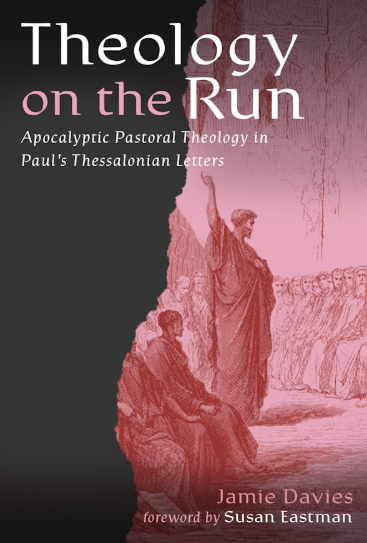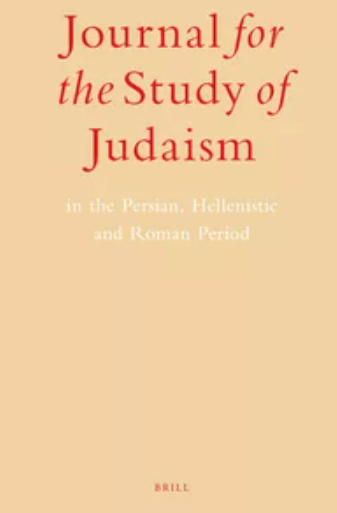[ 신간 소개 ] 2025. 9. 30
'묵시문학적 목회 신학'(apocalyptic pastoral theology)에 관한 연구서를 쓴다는 것은 '수행적 자기모순'의 행위처럼 들릴 수 있다. 그러나 이러한 시도는 임박한 주의 재림에 대한 기대, 즉 예수 운동의 1세대에 만연했던 희망이 평범한 기독교인의 삶에 거의 가치가 없는 당혹스럽고 불필요한 교리가 아님을 상기시킨다. 신약학계의 많은 이들의 가정과는 반대로, 기독교 신학에 묵시문학적 긴급성을 처음 부여한 이는 바울이 아니라 예수 자신이었다. 따라서 기독교 신학은 그 태동부터 'theology on the run' 이었다.
이는 문자 그대로 데살로니가에서 '도망 중'일 때 서신을 썼던 바울에게도 마찬가지였다. 이 서신들을 읽어 온 오랜 독자들의 대열에 합류하여, 제이미 데이비스는 바울의 종말론적 확신이 인식론 및 우주론에 대한 확신과 더불어 어떻게 그의 묵시문학적 DNA'를 구성하고 그의 사상과 실천의 모든 측면에 영향을 미쳤는지를 탐구한다. 'theology on the run' 은 바울의 묵시문학적 사상의 이러한 윤곽에 대한 연구를 통해, 신생 데살로니가 교회의 '현실 세계' 속 삶의 도전들을 다루는 목회자로서의 바울을 전면에 내세운다. 격동의 시기에 신실한 교회를 세우고 유지하는 데 힘썼던 1세기 마케도니아의 실천적 목회 신학자로서의 바울의 사역에 그의 묵시문학적 사상이 무엇을 의미했는지를 고찰하는 것은, 오늘날 교회의 사역에 종사하는 이들과 그들을 가르치는 이들이 왜 '도망 중인 신학'을 수행하려는 우리 자신의 노력 속에서 바울의 묵시문학적 목회 신학을 이해해야 하는지에 대한 설득력 있는 논거를 제시한다.
바울의 독자들은 종종 묵시문학적 종말론이 "기독교 신학의 어머니"였다는 에른스트 케제만의 격언을 인용한다. 이에 데이비스는 "기독교 윤리는 살아내는 종말론이다"라는 또 다른 격언을 덧붙인다. 목회 신학이 일부를 이루는 윤리에 대한 모든 설명의 중심에는 "현실 세계란 무엇인가?"라는 형이상학적 질문이 자리한다. 데살로니가 서신에서 우리는 바울이 슬픔, 노동, 성(sex), 진리, 권력, 억압이라는—오늘날 교회가 마주한 지속적인 도전들인—데살로니가의 목회적 상황에 새 창조의 묵시문학적 실재를 적용하는 것을 본다. 바울은 자신의 묵시문학적 복음에 따라 이 도전들을 재구성함으로써 그것들에 맞선다. 그렇게 함으로써 그는 이 묵시문학적 복음과 목회 사역 사이의 깨뜨릴 수 없는 관계를 통해, 인간의 철학적 전통이나 사회심리학적 실천에 기독교적 해설을 덧붙이는 것을 넘어 생각하도록 우리에게 도전하는 목회 신학을 보여준다.
Writing a study in apocalyptic pastoral theology may sound like an exercise in "performative self-contradiction." But such an endeavor reminds us that the imminent expectation of the Lord’s return, a pervasive hope in the first generation of the Jesus movement, is not an embarrassing, superfluous doctrine of little value to ordinary Christian life. Against the assumptions of many in the guild of New Testament studies, it was not Paul but Jesus himself who first gave Christian theology its apocalyptic urgency. From its very beginnings, then, Christian theology was "theology on the run."
This was true for Paul, who penned his correspondence to Thessalonica while literally "on the run" from the city. Joining a long line of readers of these letters, Jamie Davies explores how Paul’s eschatological conviction, together with convictions about epistemology and cosmology, constituted his "apocalyptic DNA," shaping every aspect of his thinking and practice. Through study of these contours of Paul’s apocalyptic thought, Theology on the Run brings forward Paul in pastoral mode as he addresses the challenges of life in the "real world" of the fledgling Thessalonian church. A consideration of what Paul’s apocalyptic thought might mean for his work as a practical and pastoral theologian in first-century Macedonia, concerned with planting and sustaining faithful churches in tumultuous times, presents a compelling argument for how and why those engaged in the ministry of the church today, and those who teach them, need an appreciation of Paul’s apocalyptic pastoral theology in our own efforts to do "theology on the run."
Readers of Paul often cite Ernst Käsemann’s maxim that apocalyptic eschatology was the "mother of Christian theology." To this Davies adds another: "Christian ethics is lived-out eschatology." At the center of any account of ethics, of which pastoral theology is part, is the question of metaphysics—what is the "real world"? In the Thessalonian letters we see Paul bringing the apocalyptic reality of the new creation to bear on the pastoral situation in Thessalonica, facing challenges of grief, work, sex, truth, power, and oppression—enduring challenges for the church today. Paul meets these challenges by reframing them according to his apocalyptic gospel. As such, he demonstrates a pastoral theology that challenges us to think beyond Christian glosses on human philosophic traditions or social-psychological practices through the unbreakable relationship between this apocalyptic gospel and ministerial practice.
[ Contents ]
Foreword by Susan Grove Eastman
Acknowledgments
Introduction: Bridging the Apocalyptic and the Pastoral
Part 1 Paul as an Apocalyptic Pastoral Theologian
1 Paul as an Apocalyptic Theologian
2 Paul as a Pastoral Theologian
Part 2 Apocalyptic Pastoral Theology in the Thessalonian Letters
3 The Word of the Lord and Christian Formation: Paul’s Apocalyptic and Pastoral Epistemology
4 The Coming of the Lord and the Christian Life: Paul’s Apocalyptic and Pastoral Eschatology
5 The Triumph of the Lord and the Christian Struggle: Paul’s Apocalyptic and Pastoral CosmologyConclusion: Paul’s Apocalyptic Theology and Pastoral Ministry in the "‘Real World"’






